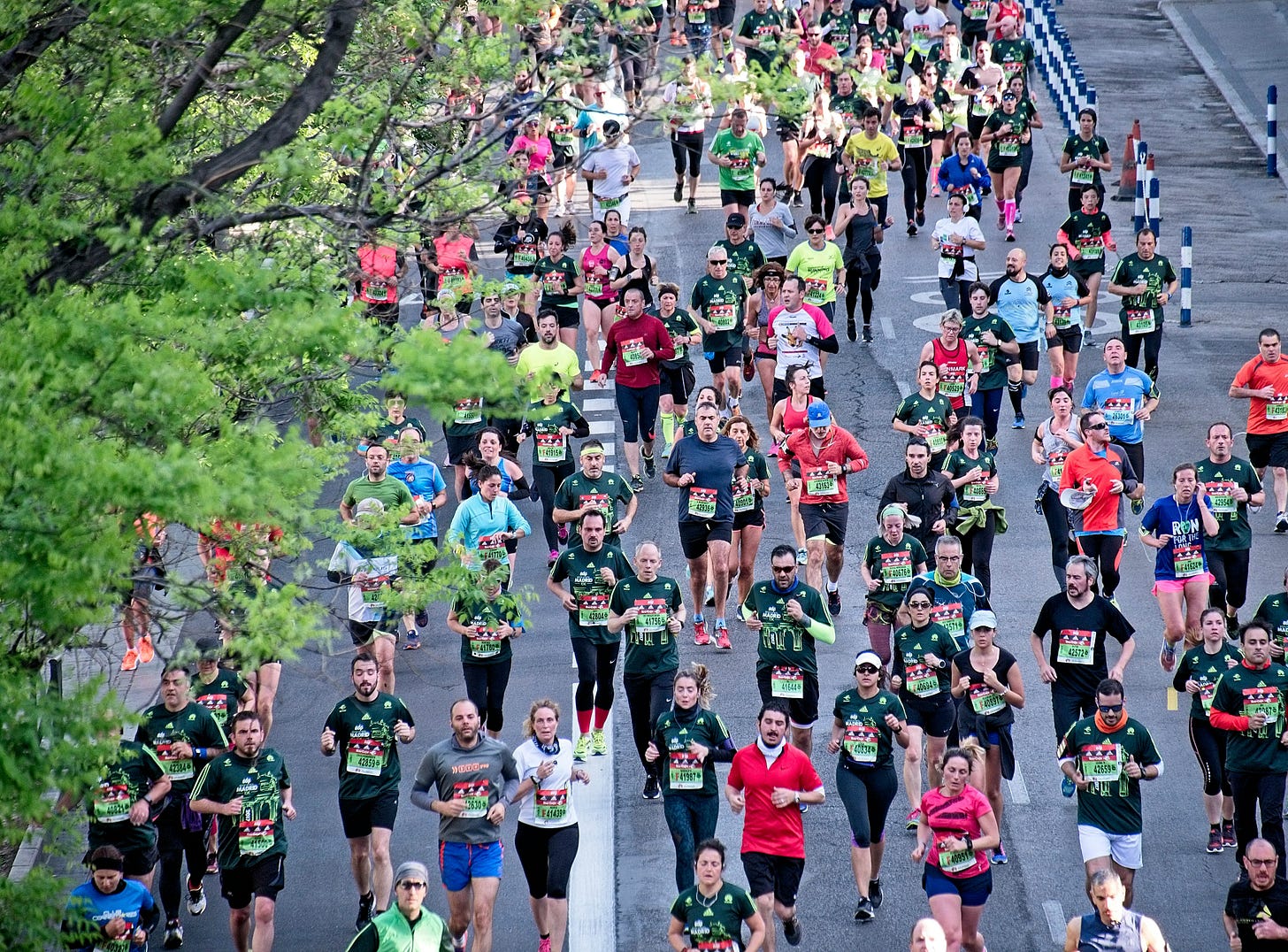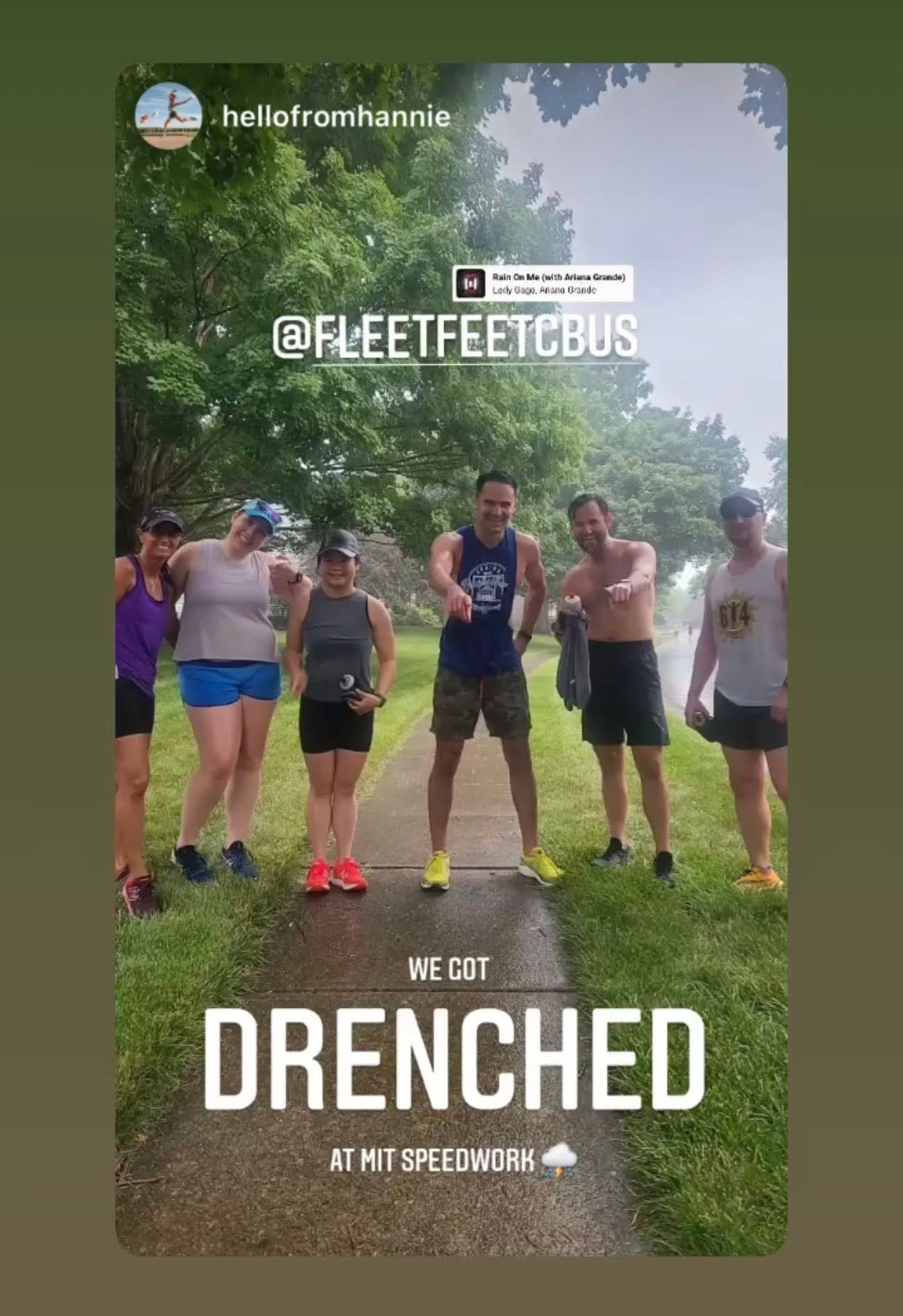I Joined a Run Club to Escape Loneliness — It Changed Everything
Plus 3 Suggestions that will help you find belonging

Long before I ever ran a marathon – or even knew what a mile split was - I went to my first Grateful Dead show.
Technically, it was Dead and Company, the newest version of the Grateful Dead featuring John Mayer as the lead guitarist and vocalist. I went with two of my college buddies, Cody and Phil.
Honestly, I didn’t know what to expect.
The band launched into these sweeping improvisational solos. The lyrics transported you to a bygone American fantasyland, as if you had stepped into a John Steinbeck novel. And the visuals? Floating graphics and kaleidoscope lights that turned the whole arena into a trippy cathedral.
I was hooked for life.
The music and the lights were cool, but what really got me was the people. Standing there with my friends, I felt like I was a part of something. It was the feeling my parents tried to describe when they talked about church—community, connection, belonging. But where they found it in pews and church potlucks, I found it swaying in a crowd singing “Ripple.”
That night, I met Phil’s father. A real life “Deadhead” – the nickname given to loyal Grateful Dead fans.
“How many Grateful Dead shows have you seen?” I asked him.
“126,” he said, like it was no big deal.
How many did you see with Jerry Garcia?” I asked again.
“126! I don’t count the shows without Jerry.”
Phil’s Dad spent his collegiate summers trailing the Grateful Dead. He sold grilled cheese sandwiches in the parking lot before concerts to help pay for gas, food, and tickets. He traveled with others doing the same thing. They’d hang out, talk about Jerry, smoke weed, and stand together at the shows.
Community, connection, belonging.
Ideas that seemed to come easily to my parents with church and easy to Phil’s dad with grilled cheese sandwiches and The Dead.
So, what happened to us?
My generation (millennials and some Gen Z) has been called many things—entitled, lazy, soft. But more than anything, we've been labeled the lonely generation. I still remember the headlines the day the U.S. Surgeon General declared loneliness and isolation a public health epidemic.
And it is. About 30% of U.S. adults report feeling lonely at least once a week, with 10% saying they feel lonely every single day.
Young adults—especially young men—are hit the hardest. A 2024 report found that 30% of people in our age group experience loneliness on a weekly basis.
Why does this matter? Because, according to the Surgeon General, it's not just a mental health issue—it's life or death. Chronic loneliness has the same impact on your health as smoking 15 cigarettes a day.
My Own Battle with Loneliness
I got to listen to Scott Galloway talk at a SXSW event in Austin a few months ago.
My shoulders tensed as I sat up and gripped the edge of my seat, listening to his views on the alarming decline of young men in America.
For those who may not know, Scott Galloway is a business professor at NYU, known for his candid opinions on the struggles young men face today—issues like loneliness, difficulty forming relationships, and the rise of misogynist influences like Andrew Tate, Jordan Peterson, and the MAGA movement.
Why did I get so tense during his talk?
I realized that there was a world where I could have found myself in that situation—feeling isolated and lost.
Things are much better now. I haven’t felt lonely in a long time. I attended the talk with my girlfriend, who I now live with, and I’m never short of social things to do. In fact, I often overextend myself and need to learn to say no to things.
But Scott reminded me of a time when I did feel like one of those lonely young men.
Single and devoid of friends. A lot of it due to COVID but also because I didn’t have many prospects.
Struggling to find purpose or people to admire.
Physically unfit with bad habits.
So when Scott Galloway says the most dangerous person in the world is a lonely, single man with a computer, I get it.
It’s like watching a plane crash on the news—and realizing it’s one you were supposed to be on, if your Uber hadn’t been a few minutes late.
How Running Helped Me Find Community
I remember feeling especially lonely after a breakup.
In tough times, I’ve always turned to books—and this time was no different. I picked up Heartbreak: A Personal and Scientific Journey by Florence Williams. It’s about a psychologist who goes through a divorce after her husband of 25 years leaves her for a younger woman. She documents not only the emotional fallout but the physical toll heartbreak takes on the body, drawing from her own experience and scientific research.
A light read, I know.
Anyway, in the book, she talks about a government agency in the UK created specifically to combat loneliness. No joke—it’s called the Loneliness Bureau, and it’s staffed by 12 ministers, including an actual Minister of Loneliness. It sounds like something out of a Harry Potter book, but it’s real.
One of their top initiatives is called Men’s Sheds. The program opens up public garages across the country where people—mostly men—can come together to work on projects. Think fixing up a car, building a deck, or even getting help studying for an exam. The idea is simple: bring a task and do it alongside others. Connection through shared work.
You might laugh, but not after you read the statistics: Surveys from and UK and Ireland show that 96% of Men’s Shed members reported feeling less lonely after joining.
It got me thinking: maybe I felt lonely because… I was spending too much time alone. Revolutionary, I know.
So I figured I needed to find my own version of a Men’s Shed.
That’s when I joined a run club. Why running? Well, running came naturally to me. I liked how it got me outside, provided fresh views of the city, and cleared my head. I loved running without headphones and enjoying the woods on a manicured trail. Running felt like a good place to look.
Believe it or not, there weren’t many run clubs in Columbus, Ohio, in the winter of 2022. The only one I could find was Fleet Feet – a national running brand available in most cities. I begged my friend Jonathon to join with me – kind of like begging a friend to go to a high school party because you don’t want to show up alone and awkward.
Like me, Jonathon likes a good challenge, so he didn’t take much convincing, and it wasn’t long before we signed up for our first marathon.
At the time, I wouldn’t have recommended Fleet Feet to any young men looking for a date. We were among the youngest people there—and we were 28. The only person younger than us was a 16-year-old cross-country kid who, judging by the look on his face, had definitely been forced to come because he was spending too much time smoking weed and gaming in his basement.
But the goal wasn’t to find a date; it was to find community.
We got close to our running family and learned their stories. One woman we met ran 12 straight Boston Marathons. She started running at age 50 after separating from her husband.
The point is, we didn’t have much in common besides running, but they were people we would see at the same time each week, without fail. They cared about you, and you cared about them.
That, in a nutshell, is community.
Even though I was single and reeling from heartbreak, the weekly run club helped me feel less lonely. I realized - so as long as I had this in my life - I was going to be just fine.
I guess that’s the main point of this article: If you’re feeling lonely, find your own Men’s Shed.
A run club isn't a bad place to start.
A Few Suggestions for Finding Community When You’re Feeling Lonely
1. Observe Yourself
The best community is one built around something you genuinely enjoy.
For me, that was running. Getting to do something I love with people who love it too? That’s hard to beat.
If you’re not sure what excites you, start paying attention to what you naturally gravitate toward when no one’s watching. Do you love to read? Watch Premier League matches? Play chess?
Make a list of the things you do when you’re off the clock—then see if there’s a local group or club around that interest. Odds are, there is.
2. Keep an Open Mind
Sometimes we show up to a group expecting too much—we want to find a best friend, a romantic partner, people our exact age, who think like us, vote like us, and listen to the same podcasts.
But when you log off social media and step into a real-life community, you’re going to meet real people. And real people are different.
There’s a run club in Austin with the motto: “All faces, all paces.” That stuck with me. It means everyone is welcome. When Jonathon and I joined Fleet Feet in Columbus, we were the youngest by far—but they still became like family.
Let go of the expectations. Come in curious. Stay open.
3. Step Outside Your Comfort Zone
Let’s be real—the first time you join a club, it’s going to feel like the first day of high school all over again.
When I moved to Austin, I had to walk up to a group of women chatting after a run and say: “Hi, I’m Cal. I just moved here.”
It was painfully awkward. But some of those women are now close friends.
You’re joining a space where people already know each other. That’s normal. You’ll probably have to introduce yourself and push through some discomfort.
But trust me—it’s not high school anymore. People aren’t judging you. They’re just glad you showed up.







